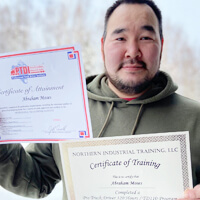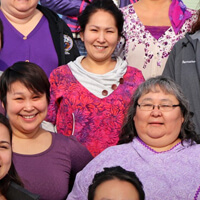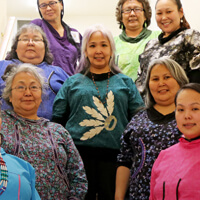
We also assist pregnant women in their last trimester who have no other children. Qualifying families in the AVCP region are given monthly cash assistance.
To qualify,
you must be both:

Over the age of 18; and
The legal guardian of children under the age of 18 or children under the age of 19 who are still enrolled in school as full time students.
Recipient must spend at least 25 hours a week on work activities.
Some examples of work activities:
- Applying for employment (this activity is limited to a maximum of three hours per week)
- Subsistence activities
- Community service
- Studying to pass the GED exam
For activities to count toward TANF required work activity hours clients must

Record work activity hours using the Work Activity Sheet, that must be completed by the first of every month and submitted to the client’s TANF case manager with the required signature of a verifier and the verifier’s phone number;
Weekly meetings with Case Manger to review work activities;
Completion of a Family Self-Sufficiency Plan to work toward financial stability and security; which includes setting a short-term and long-term goal.

“TANF really does help out with my bills when I get behind and how supportive services helped me out before with clothing for my kids.”
– Balasia Nicholas

“I was able to buy diapers for my son; they are so expensive. Thank you TANF.”
– Elizanna Anvil
Useful Resources


FAQs
Frequently Asked Questions
A: Yes. You become eligible for TANF benefits if you’re in your last trimester.
A: If there is an absent parent(s) we must submit a child support form notifying the State of Alaska that the applicant is applying for TANF. If the parent is not providing child support we must provide an explanation of just cause to the state. (justifications include the parent is deceased, if the child is in legal proceedings toward adoption)
A: TANF eligibility is based on the guardians’ income, not the entire household’s income. TANF benefits go to the parents, not the homeowner. However, energy assistance benefits are provided to the head of the household, and not to the parent.
A: Supportive services are available in crisis situation. However, this benefit cannot be provided over four months in a year. If you are in a crisis situation, please contact your case worker to ask about supportive services.







